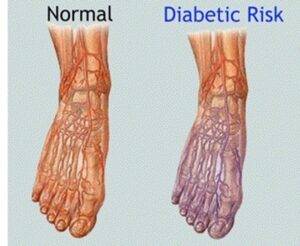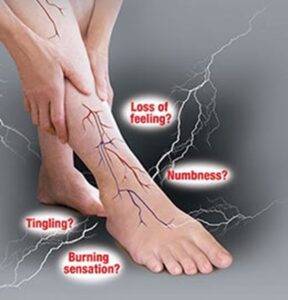What is Nerve Pain?
Nerve pain occurs when the nerves responsible for sending signals to the brain malfunction or become damaged. It is typically described as a sharp, burning, or electric shock-like sensation. In some cases, it may even feel like numbness or tingling in affected areas. Unlike regular pain, which usually responds well to common painkillers, nerve pain is more persistent and challenging to treat.
Nerve pain may come and go or remain constant, often worsening over time. It can occur in a specific area of the body or be more widespread, depending on the underlying cause. Because of the complex nature of the nervous system, nerve pain can vary greatly from person to person, making it essential to identify and treat it promptly.

Common Causes of Nerve Pain
Nerve pain can be caused by various conditions and injuries that damage the nerves. Some of the most common causes include:
- Diabetes: One of the leading causes of nerve pain is diabetic neuropathy. High blood sugar levels can damage the nerves over time, especially in the legs and feet, leading to persistent nerve pain.
- Injuries: Trauma or injury to nerves, such as from accidents, surgeries, or even repetitive strain, can lead to nerve pain. Conditions like carpal tunnel syndrome also fall into this category.

3. Infections: Certain infections, such as shingles or HIV, can attack the nerves and cause pain. Shingles, in particular, can lead to a condition called postherpetic neuralgia, where nerve pain lingers long after the rash heals.
4. Autoimmune Disorders: Conditions like multiple sclerosis (MS) or lupus can cause the immune system to attack healthy nerve tissue, resulting in neuropathic pain.
5. Chemotherapy and Medications: Cancer treatments like chemotherapy can damage nerves, causing neuropathy in some patients. Certain medications may also have similar side effects.
6.Alcoholism: Long-term alcohol abuse can lead to nerve damage, particularly in the extremities, leading to a condition called alcoholic neuropathy.
Why Nerve Pain is Serious
Nerve pain is not only physically painful but can also take a heavy toll on mental and emotional well-being. Chronic pain can lead to depression, anxiety, and even sleep disturbances. Unlike other forms of pain that might subside with time or rest, neuropathic pain is persistent and can worsen over time if left untreated. Because nerve pain often doesn’t respond well to over-the-counter pain relievers, many people suffer in silence, which can lead to a decline in overall quality of life.

Furthermore, nerve pain may be a symptom of an underlying condition that requires medical attention. For example, uncontrolled diabetes can lead to severe complications, including limb amputation in extreme cases. Ignoring nerve pain can delay the diagnosis of these conditions and potentially worsen the prognosis.
The impact of nerve pain on daily life
Living with nerve pain can make even the simplest tasks seem unbearable. Activities like walking, writing, or even resting can become sources of discomfort. People with nerve pain may experience:
- Reduced mobility: Pain in the legs or feet may make it difficult to walk, exercise, or maintain an active lifestyle, leading to other health issues like weight gain or cardiovascular problems.
- Sleep disturbances: The constant pain, tingling, or burning sensations can make it challenging to fall or stay asleep, resulting in chronic fatigue.
- Emotional distress: Chronic pain often leads to feelings of frustration, anxiety, or depression, as it disrupts daily routines and the ability to enjoy life.
- Difficulty concentrating: Persistent pain can make it hard to focus on work, hobbies, or other activities, leading to a decline in productivity and overall satisfaction.

Why We Should Not Ignore Nerve Pain
Ignoring nerve pain can have severe consequences. Without proper treatment, nerve pain can become more severe, and the underlying cause may worsen. For instance, if the nerve pain is due to diabetes, failing to address it could lead to further complications like foot ulcers or amputations. Similarly, untreated infections or autoimmune disorders may lead to more extensive nerve damage and more challenging treatment outcomes. Early diagnosis and treatment are crucial for managing nerve pain effectively.
How to Treat Nerve Pain
Treating nerve pain often involves a combination of approaches tailored to the underlying cause. Common treatment options include:
- Medications: Prescription medications such as anticonvulsants, antidepressants, or topical treatments may help manage nerve pain.
- Physical Therapy: Physical therapy exercises can help strengthen muscles and reduce nerve pain, especially in cases of injury or repetitive strain.
- Lifestyle Changes: For conditions like diabetes or alcoholism, managing the underlying cause can help reduce nerve pain. This includes controlling blood sugar levels, reducing alcohol consumption, and maintaining a healthy weight.
- Acupuncture: Acupuncture has emerged as a natural and effective treatment for managing nerve pain by stimulating the nervous system and promoting healing.
Does Acupuncture Help Nerve Pain?
Acupuncture is an ancient form of Traditional Chinese Medicine that has gained popularity for its effectiveness in managing various types of pain, including nerve pain. Acupuncture works by stimulating specific points on the body to promote energy flow, reduce inflammation, and encourage the body’s natural healing processes.
Several studies have shown that acupuncture can provide relief for people suffering from nerve pain by improving blood circulation and reducing the intensity of the pain signals sent to the brain. It also helps release natural painkillers like endorphins, which can reduce pain and promote relaxation. Many patients report significant improvements in their nerve pain symptoms after a few sessions of acupuncture.

Why You Need a Consultation
Before starting any treatment, including acupuncture, it’s essential to consult with a healthcare professional to determine the root cause of your nerve pain and develop a tailored treatment plan. A consultation allows the practitioner to assess your overall health, understand your symptoms, and decide if acupuncture is the right approach for you.
At Aculosophy, we’ve had great success treating nerve pain with acupuncture, and we hope to help you too. During your initial consultation, we will assess your condition, recommend any necessary lab tests, and begin your personalized treatment plan.
If you’re experiencing nerve pain, don’t wait for it to worsen. Contact us today to schedule a consultation and take the first step toward relief and healing.
Call us at 647 342 2281 or email us at [email protected]